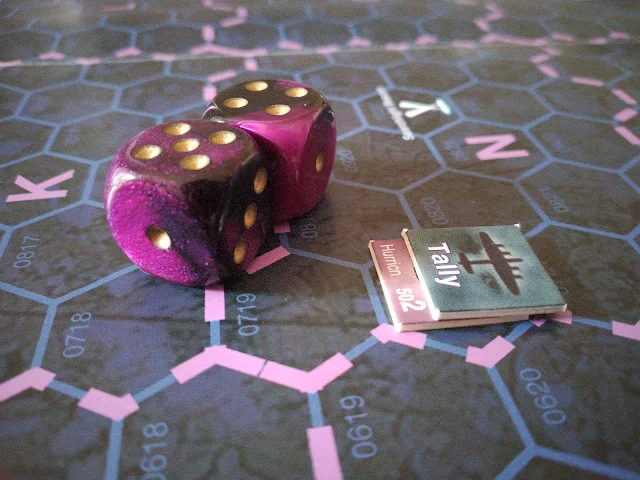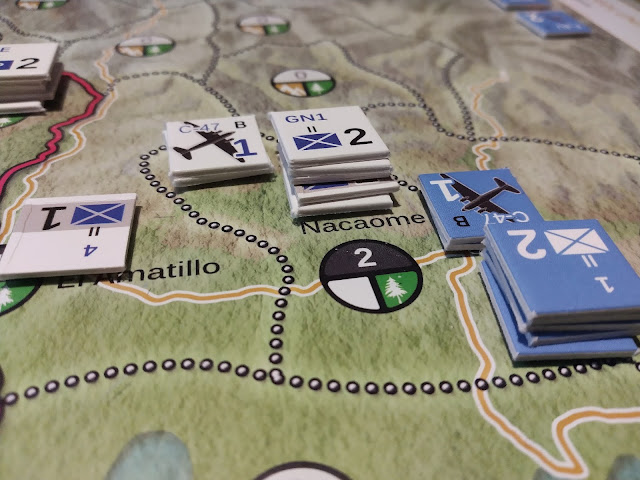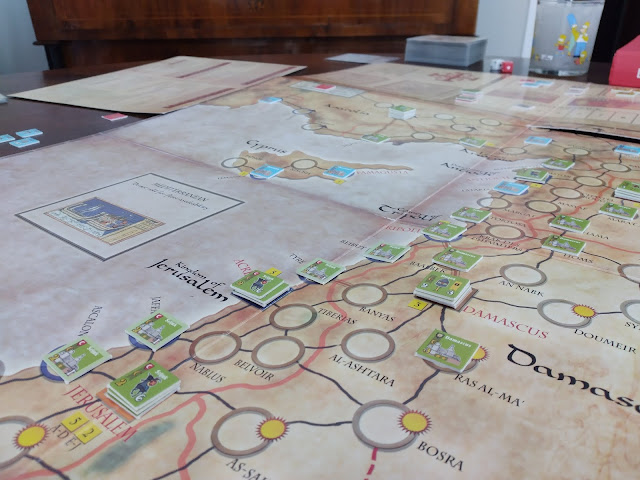Nightfigther. A blaze in the english skies
East Sussex. Late September, 1940. Night
A lone fighter, a Hurricane Mk 1, patrols the skies of southern England.
The Battle of Britain is now over: the fight for air supremacy in the English skies has led to a clear victory for the RAF. Since several days the German raids on London have decreased in number and intensity and the Axis air force is being redirected to other uses.
Though, it is not yet the moment to let the guard down. A German blitz could strike at any moment, theoretically even at night. And so entire teams of Hurricane planes, designed for daytime use, so devoid of instrumentation for nightfighting that they are almost useless for this purpose, are sent on long and desolating explorations of the English skies.
 |
| A random view. |
Scattered over a large territory, these teams travel without radar, without ground guidance, in skies illuminated only by moonlight, trying to see any passing enemy aircraft with the naked eye.
It is an uncomfortable routine mission, more dangerous for the risk of accidents than for the actual possibility of encountering enemy aircraft. Suddenly, however, the Hurricane's pilot overhears something. A different vibration, more powerful than that of its noisy engine. He looks around. The minutes go by, the kilometers too.
The sky is not clear that night. Conversely, a sea of low cloud extends beneath the wings of the Hurricane. Illuminated by the power of the moonlight, they are a shroud that shines with its own light, on which it is possible to read the silhouettes of hypothetical enemy aircrafts. The only hope, for a night pilot without specific instrumentation, is to identify the contours of his enemies on that white and luminous veil.
 |
| The Hurricane moves behind the Heinkel and does its job. |
The pilot looks around, guided by instinct. And suddenly there is a movement. He is not alone. Another plane flies through the skies. Not even a mile from him, a twin-engined, obviously German-made Heinkel He111H, is traveling north. And even if the British driver doesn't know it, that Heinkel is not alone either. Dozens of other planes of the same type travel in a long but orderly line towards London. An attack on the English capital is beginning.
The Hurricane launches itself behind the German plane. Despite the far superior power of its engines, the bomber is heavy, and is therefore much slower than the fighter, which performs a maneuver to change its course, align it with that of the bomber and position itself just behind it. While doing this the pilot almost loses sight of the Heinkel. He estimates the speed of the German plane, follows its hypothetical direction, and, thanks to a little luck, finds it beyond a mound of clouds. On board it seems that no one has noticed his presence. He aligns his position perfectly. Then it fires.
London suburbs. One hour later
A myriad of light beams cut the sky. There are no clouds here to reflect the light of the full moon. Visibility, due to a higher degree of humidity, is lower than in the South. Nightfighting would be completely impossible if it were not for the spotlights that, from the ground, illuminate the starry night in search of enemy bombers.
 |
| The searchlights fix a bomber flying by. |
Various Hurricane squads have been scattered across the capital's skies in an attempt to locate and shoot down as many bombers as possible. Little is known about the German forces. However, it is known that, following the shooting down of some of their planes in the skies of East Sussex, their operators have given themselves a wake up call. The He111H, although not particularly powerful, are able to defend themselves and carry out evasive maneuvers that would can put the RAF in difficulty.
Suddenly, a British pilot sees a certain agitation in the spotlight of one of the most peripheral sectors. It is clear that the ground operators must have seen something. He immediately heads in that direction, and begins to fly over the sector, while trying to spot an enemy bomber with the naked eye. He sees nothing, but suddenly, behind him, one of the headlights fix one of the Heinkels. It is certainly the first one of a long series. While other Hurricanes rush in that direction, the pilot decides to take the initiative and focus on this first attacker.
He moves away, making a maneuver to turn his aircraft and align with the German one. In doing so he loses sight of the enemy, and the same happens to the searchlights: when the He111H reaches the limits of the sector, the searchlight that was aiming it is unable to coordinate itself with another to do a hand-off and so, for about one minute, the German bomber disappears from the English field of view. These are endless anxious moments, after which the searchlights find the enemy plane again, allowing the Hurricane to throw itself behind him.
The bomber immediately reacts, without leaving the Hurricane the time to fire first. One of the rear machine guns fires towards the Hurricane, without hitting it, after which the German plane performs an evasive maneuver, gliding quickly to the left. The searchlight, once again, fails to follow him, while the British pilot believes that it is a feint and continues to travel without changing his course, immediately losing sight of him in the dark of the night.
 |
| Ths second hit hits. |
Two kilometers later, while the searchlights struggle to track down the lost plane, and the ones on the periphery switch on again - a sign that a second bomber is incoming - the Hurricane decides to make a bet. He launches himself to the left, hoping to find the bomber by looking for it with the naked eye ... and so it happens. This time he's the one who shoots it. He hits it, damaging it slightly, while the German makes a second evasive maneuver, now gliding to the right.
But by now the English has understood the logic. Even without the help of the searchlights, which meanwhile also detect a third bomber incoming ten miles to the east, he follows the movement of the enemy bomber. The latter shoots blindly, going very close to hitting the British fighter. After that, just as the bomber is finally re-illuminated by the searchlights from the ground, the Hurricane fires and hits it again. The Heinkel begins to lose altitude.
 |
| The final chase. |
Central London is now below them. If it continues in its pursuit, the Hurricane will end up outside the operational area. He could leave this bomber to other colleagues of his and focus on the other planes passing behind him. The pilot carefully evaluates his move. In the RAF's command these initiatives aren't appreciated, but the opportunity is tempting. He decides to try it all out.
While the German gunner shoots wildly at him, despite failing to land a shot, the RAF pilot stabilizes his aircraft and aims. Then he shoots. One shot, precise.
The He111H explodes in a blazing flame.
The Hurricane avoids the debris, continuing straight, beyond the limits of the operational area. The pilot, blinded by the explosion, unable to see anything else outside of his instrumentation and the beams of light that plow the sky, opts not to correct his trajectory.
Scenario 1, "Cat's Eyes": Player Victory
Scenario 1A, "London Blitz": Player Victory
Do you want to read other stories? Click here for the full list.








Comments
Post a Comment